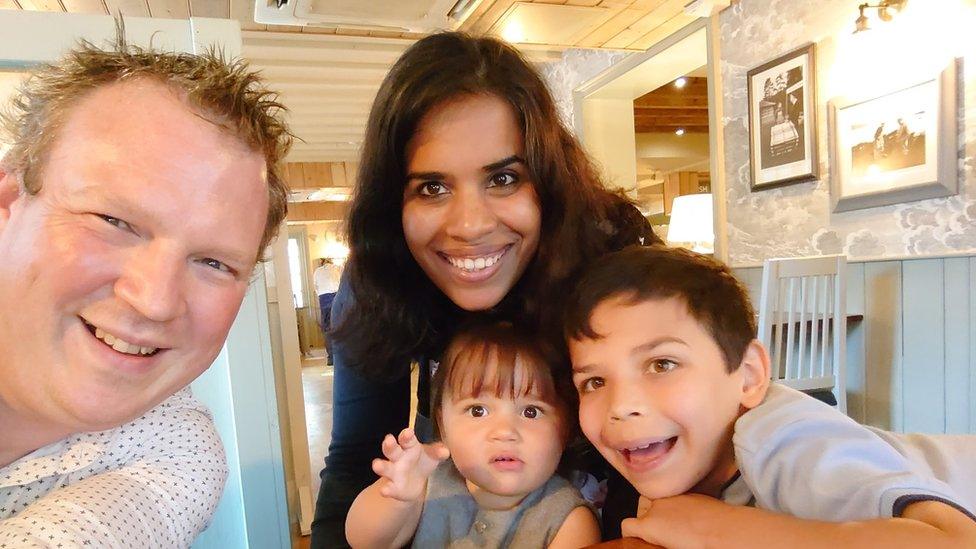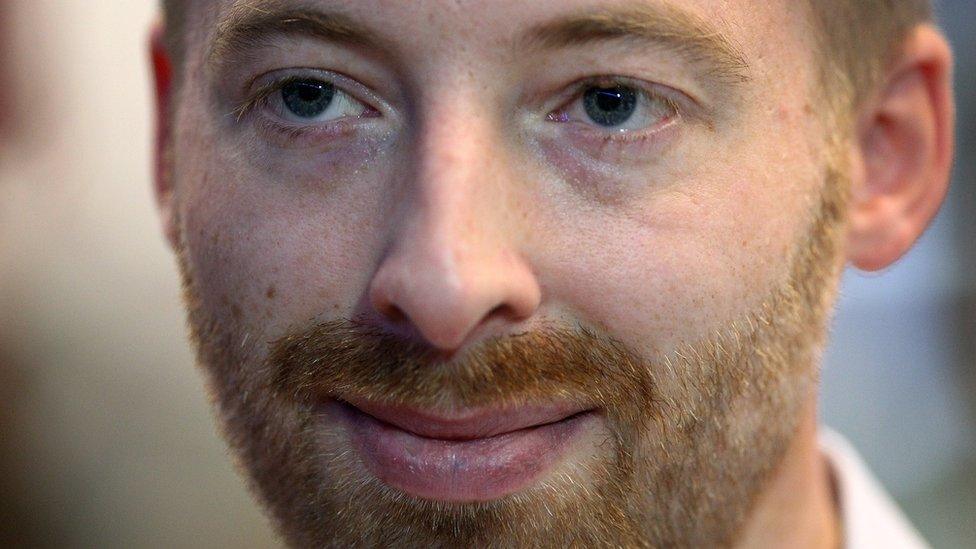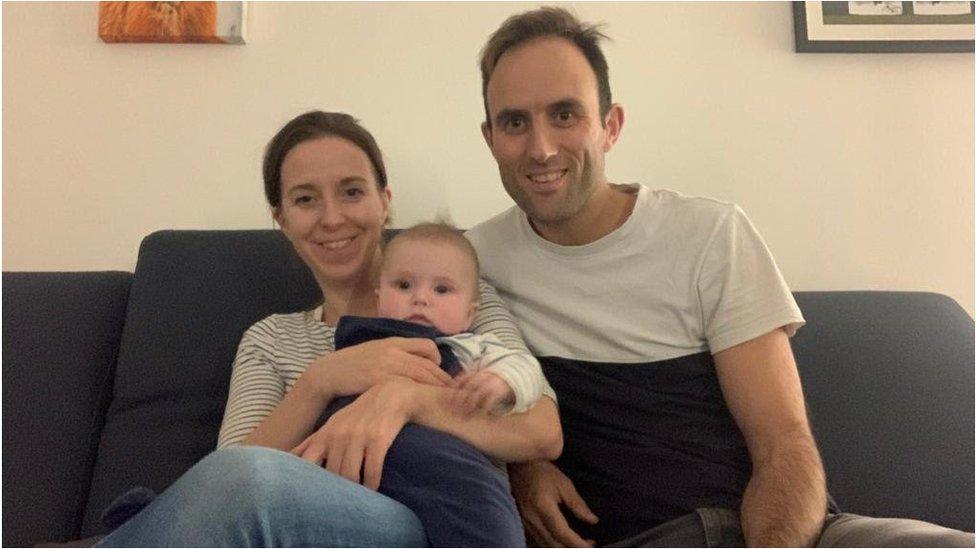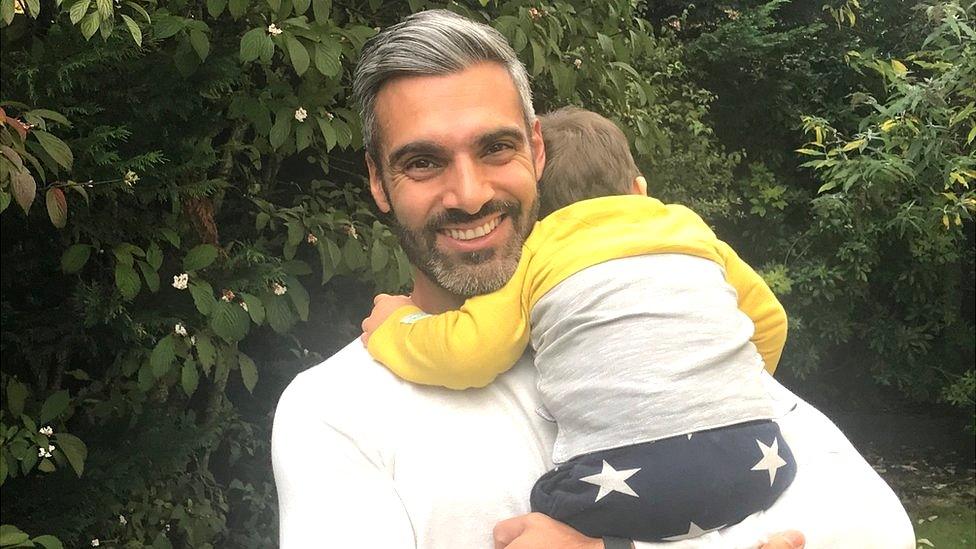'I became a full-time dad for my wife's career'
- Published

David Robinson says the decision to support his wife's career has paid dividends
Eight years ago David Robinson decided to take a year out to raise his son.
After discussing childcare with his wife Tahina, they came to the conclusion that she, a barrister, would suffer more of a career setback if she took the time off. Other women in the field had had to fight to get clients back when they returned to work.
So he took advantage of a workplace redundancy scheme and became a full-time father.
It was a not a common thing to do.
"Even the groups were called mother and baby clubs," he says. "I'd rock up and I'd get two reactions: one that I was a widower and the slightly more common one was they'd ask about my husband."
Eight years on, it is still uncommon enough to make headlines, even though parents can now share leave.
Last week, the boss of European fashion chain Zalando said he would quit his role in order to support his wife in her career.
Rubin Ritter, co-chief executive of Zalando since 2010, said he wanted to devote more time to his family.

Zalando's Rubin Ritter made headlines when he quit his role to support his wife in her career
Since 2015 in the UK, shared parental leave has allowed parents - after birth or adoption - to share up to 50 weeks of leave and up to 37 weeks of pay.
Official statistics aren't routinely published but take-up is thought to have been low.
Research by law firm EMW suggests only 13,100 couples used the scheme last year, about 2% of those eligible., external Low pay is thought to be a contributor.
Mr Robinson, a financial adviser, says it's still the thing he gets most questions about on his CV.
But it was the right decision, he says. It meant that as his wife travelled for work, he could join her and they could both spend more time with their son Javier.

Julie Ross, chief operating officer at UK company Portman Dental Care, which runs dental surgeries, said she realised taking a long time off would not just hit her career immediately, but also create a vicious cycle.
"We'd seen a lot of friends do it and fall into the situation of where it makes more sense financially for the woman to stay at home," she said.
"But the the woman's career falls behind. And then it never makes sense to prioritise the woman's career because they fall further and further behind."
She took eight weeks of maternity leave to have her son Culann, while her husband Adrian, who works for a biotechnology firm, had 12 weeks off, unpaid.
The couple have high-pressure jobs, but they felt that he could bounce back more easily from taking leave.
"He realised that to take time out to look after his child would be seen very positively, and it has been. He's seen as a trail blazer," she said.

Julie Ross says telling bosses about a pregnancy is still daunting.
They live in Switzerland and at the time only a day of paternal leave was available.
"I love my child dearly but I have the relationship most dads get to have, which has been the fun one who gets to do all the fun stuff."
She says she felt pressure not to be seen to be putting work second.
"I've been very lucky I work for great people, but telling people you are pregnant is very difficult at work."
"Everybody says that's great, but behind it people are thinking 'What do we do?'," she adds.
"There are lots of laws to protect people but it is smaller things. Women get looked over for big meetings and opportunities."
Pay gap problem
A UK government spokesperson said: "The government is committed to making it easier for fathers to take paternity leave. Shared Parental Leave gives parents the choice and flexibility to combine work and childcare in a way that suits them."
But earlier this year, Unicef said the UK ranked fourth lowest out of 31 European countries when it comes to family-friendly policies.
Unicef itself said it would offer 52 weeks leave and equal pay for all new caregivers, regardless of gender or sexual orientation.
Campaigners say the problem is that the rules are complex and differ from employer to employer. And the gap in pay between men and women makes prioritising women's careers expensive, especially for families who are less well-off.
Level playing field
Among full-time workers, women are paid 92.6% of men's hourly pay, according to the latest official statistics, external. Including part-time workers, the percentage drops to 84.5%.
"Male business leaders taking time out to look after their children is great because it can help change the culture, in their own families, workplaces and society more widely," said Jeremy Davies from the Fatherhood Institute think tank.
"But we also need such leaders - and the governments that set policy on work and family life - to make changes that level the playing field for fathers and mothers in the workplace, like introducing more equitable parenting leave systems and flexible working-by-default.
"Most families don't get the chance to make non-traditional choices about who goes to work and who looks after the children, because they can't afford to," Mr Davies said.
For David Robinson, getting equal time off for women and men would be a good start, as well as more people talking about it, "so it doesn't come across as a shock".
"It's entirely normal now," he says. "And the benefits will far outweigh a couple of awkward questions."
Related topics
- Published5 November 2019

- Published15 January 2020

- Published7 December 2020
